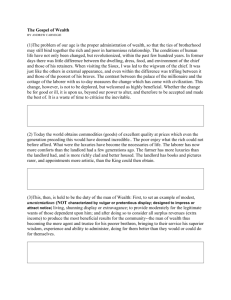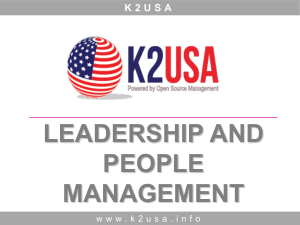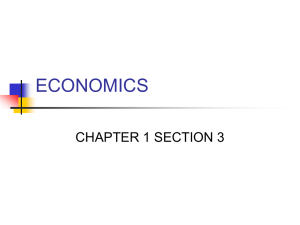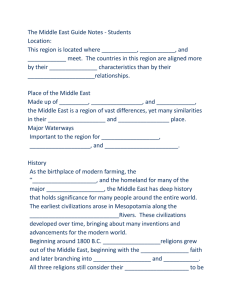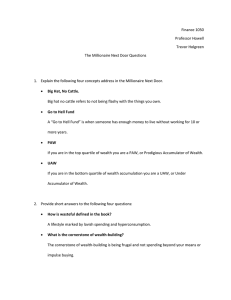Maxwell Wolcott E-Portfolio Assignment
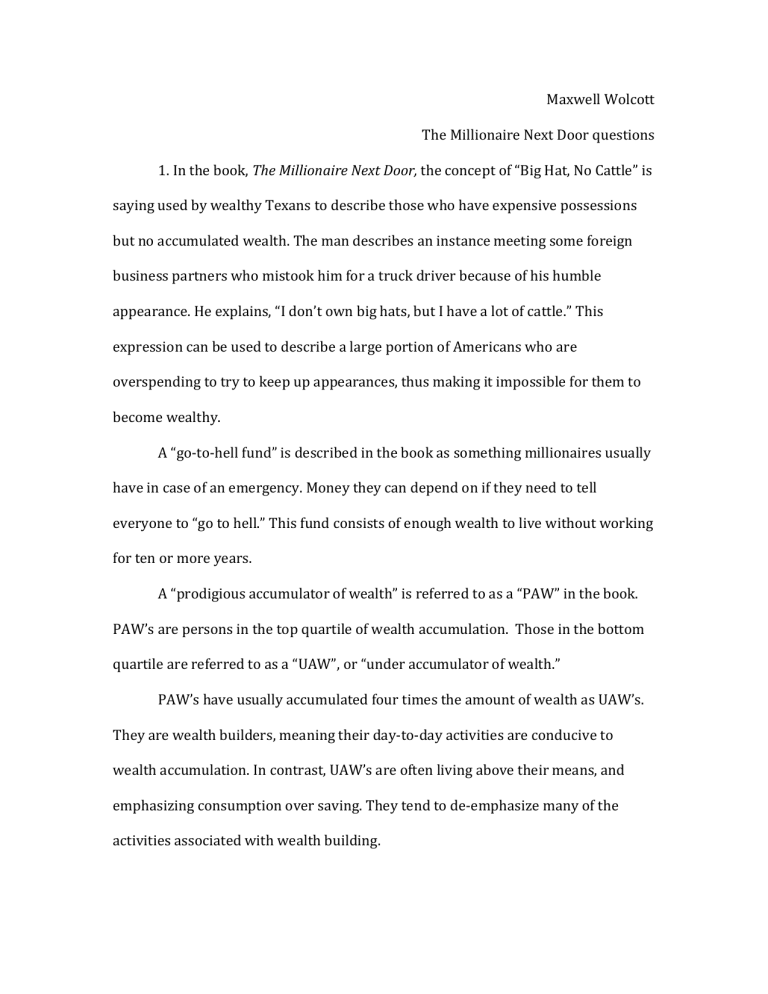
Maxwell Wolcott
The Millionaire Next Door questions
1. In the book, The Millionaire Next Door, the concept of “Big Hat, No Cattle” is saying used by wealthy Texans to describe those who have expensive possessions but no accumulated wealth. The man describes an instance meeting some foreign business partners who mistook him for a truck driver because of his humble appearance. He explains, “I don’t own big hats, but I have a lot of cattle.” This expression can be used to describe a large portion of Americans who are overspending to try to keep up appearances, thus making it impossible for them to become wealthy.
A “go-to-hell fund” is described in the book as something millionaires usually have in case of an emergency. Money they can depend on if they need to tell everyone to “go to hell.” This fund consists of enough wealth to live without working for ten or more years.
A “prodigious accumulator of wealth” is referred to as a “PAW” in the book.
PAW’s are persons in the top quartile of wealth accumulation. Those in the bottom quartile are referred to as a “UAW”, or “under accumulator of wealth.”
PAW’s have usually accumulated four times the amount of wealth as UAW’s.
They are wealth builders, meaning their day-to-day activities are conducive to wealth accumulation. In contrast, UAW’s are often living above their means, and emphasizing consumption over saving. They tend to de-emphasize many of the activities associated with wealth building.
2. “Wasteful” is defined in the book as “a lifestyle marked by lavish spending and hyper-consumption”. The cornerstone of wealth building is being frugal. Most people will never become wealthy in one generation if they are married to people who are wasteful. Upon giving his wife $8 million is stock after taking his company public, the man’s wife mentioned in the book continued her frugal lifestyle. She still cut out 25% off coupons every Saturday at her same place at the table. She still continues to do her daily chores. She has not let the money affect her and cause her to become wasteful.
Theodore “Teddy” J. Friend is a man described in the book as a classic UAW.
He is considered a UAW for 3 reasons: 1) Teddy defines his success on the value of the material possessions he has accumulated, not his net worth, 2) Teddy viewed hard work as the only path to financial success, and thus sacrificed nearly all his time working instead of being with his family. 3) Teddy chose to save money in all the wrong places; skimping on a good accountant in favor of the cheapest one.
Teddy’s parents were also UAW’s, and while Teddy earned a lot more than them, he followed in their consumption patterns. His parents’ message was simple. “One earns to spend. When you need to spend more, you need to earn more.”
Mr. W.W. Allan, a self-made multimillionaire described in the book, never extended credit to people who exhibited the “Big Hat, No Cattle” philosophy. He never did this because he was doubtful these people would be able to repay their debts. According to him, these types of people will “spend, spend, spend, in anticipation of having money before they even earn it.” Mr. Allan declined the gift of a custom-made Rolls Royce because it was incongruent with his preferred lifestyle.
He had achieved his success by living a simple, efficient lifestyle. He enjoyed outdoor activities that were inappropriate to do in a Rolls Royce. A Rolls Royce would be out of place in the manufacturing plant he operated, and it could alienate his employees from his to see him driving such a lavish vehicle.
Economic Out-Patient Care (EOC) is a behavior exhibited by parents who gift their children with large sums of money without anything in return, and thus disable from becoming self-sufficient earners. Many EOC receivers, such as the example of James from the book, view themselves as “self-made.”
As illustrated in the example of Henry and Josh, the fundamental rule regarding wealth building is: Whatever you income, always live below your means.
Laura succeeded because she had a high level of integrity. After being left to care for her three kids by her cheating husband, she did what she had to do to succeed. She got a job as a real estate professional, worked incredibly hard, and did not live above her means.
Sisters Sarah and Alice described in the book were so different because of the choices they made. Sarah did not conform to her father’s limited view of what a woman should be: a stay at home mom who never works outside the household, and is completely subservient to her husband. Because she rebelled, Sarah’s father cut her off financially. This caused her to work hard to become self-sufficient. She developed successful work habits, and started to accumulate wealth. He sister Alice on the other hand, played the role her father wanted he to, and thus received large annual cash gifts. She and her husband spent all the cash they received almost instantly, depending on cash gifts in the future to pay their debts. When Alice and
Sarah’s father eventually died, he left the majority of his wealth to Alice, and hardly any for Sarah. However, a few years after his death Alice and her husband were broke. Alice tragically died, leaving her husband and children with nothing and no ability to support the children. Sarah had to step in and set up trusts for both her and her sister’s families. They were so different regarding wealth accumulation because one was on EOC and therefore never learned effective wealth building behaviors, while the other (Sarah) was not, and thus did develop these behaviors and eventually became a self-made millionaire.
The two concepts I have found most useful in The Millionaire Next Door, were: Always living below your means, no matter your income, and the concept of
EOC. I plan to apply living below my means to my own life by creating a budget so I can better track and manage my spending habits. The concept of EOC (Economic
Outpatient Care) hit home for me because my own father was a recipient of this and
I can see how it influenced his over-consumption habits and lack of wealth accumulation behaviors. Although I have received benefits from my grandparents as well, I have not been on EOC to the same extent. I hope to be able to become completely financially independent one day soon, which was a large reason for my taking this class.
The millionaires described in this book are not unlike those I have encountered in my own experience. I am inspired to learn more about the simple lifestyles, and frugal spending habits that characterize most self-made millionaires, and hope to instill these values into my own psyche.
This assignment helped me to achieve two different SLCC Learning
Outcomes. First, it helped me to achieve and develop attitudes for life-long wellness.
Although not related to physical well-being, it helped me to learn the formulas for developing financial well-being throughout my life.
Secondly, it helped me to communicate effectively as a student. Through textbook readings, group discussions, and completion of quizzes, I developed my ability to comprehend and communicate information better while in this class.




